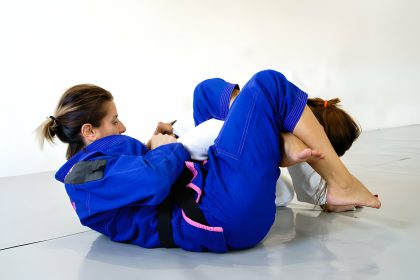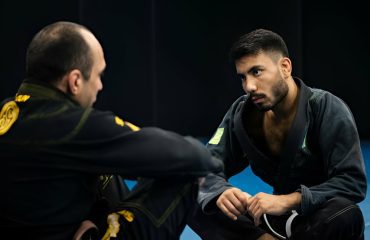
Brazilian Jiu-Jitsu (BJJ), a martial art renowned for its ground-fighting techniques and submission holds, has undergone a remarkable evolution since its inception. Once a discipline dominated by men, BJJ has seen a significant shift, with an increasing number of women not just joining its ranks but also shaping its future. This evolution reflects a broader change in the martial arts world, where the strength, skill, and determination of women practitioners are gaining well-deserved recognition.
The growing influence of women in BJJ is not just about participation numbers; it’s about changing the narrative of what women can achieve in martial arts. Women are not only learning BJJ for self-defense but are also excelling in competitions, teaching, and contributing to the sport’s development. Their involvement has brought new perspectives, techniques, and an inspiring level of tenacity to the mats, enriching the sport for all practitioners.
At NOCO Jiu-Jitsu and Self-Defense, we are proud to be part of this progressive change. Our commitment to supporting women’s BJJ goes beyond providing training opportunities; it’s about creating an environment where women can thrive, grow, and become leaders in the sport. We recognize the unique strengths women bring to BJJ and are dedicated to fostering a community where these talents are celebrated and nurtured.
The Early Days of Women in BJJ
The history of Brazilian Jiu-Jitsu is deeply rooted in a male-dominated culture, where the mats were almost exclusively the domain of men. This was not just a reflection of BJJ but of the broader martial arts world, where women often found themselves on the periphery. Despite these challenges, a handful of determined women stepped onto the mats, ready to change the narrative. These early female practitioners faced not only the physical challenges of the sport but also the societal expectations of their time, breaking down barriers with every roll and submission.
Pioneering women in BJJ, such as Leka Vieira, Yvone Duarte, and Kyra Gracie, became prominent figures, not just for their exceptional skills but also for their role in paving the way for future generations of women in the sport. These trailblazers showed remarkable resilience and determination, competing against men when there were no women’s divisions and often training in environments that were not always welcoming. Their contributions went beyond winning medals; they inspired a new wave of women to see BJJ as a sport where they too could excel.
The challenges faced by these early female practitioners were manifold. They contended with limited access to training facilities, a lack of recognition, and often, the skepticism of their male peers. Yet, their persistence paid off, slowly transforming the landscape of BJJ. These women not only proved their worth on the mats but also began to influence the culture of BJJ, making it more inclusive. Their struggles and triumphs laid the foundation for the thriving women’s BJJ community we see today, a testament to their enduring legacy in the sport.
Breaking Stereotypes and Building Confidence
Brazilian Jiu-Jitsu (BJJ) has been instrumental in challenging traditional gender roles in martial arts. Historically, martial arts were predominantly male-dominated, with women often sidelined or underestimated. However, BJJ has emerged as a powerful tool in altering this perception. The sport emphasizes technique and leverage over brute strength, making it accessible and effective for practitioners regardless of gender. This leveling of the playing field has encouraged more women to engage in BJJ, leading to a significant increase in female participation at all levels, from beginners to professional competitors.
In addition to altering perceptions within the martial arts community, BJJ has been a catalyst for personal transformation among women. Many women have shared stories of how training in BJJ has bolstered their confidence. The rigorous training, the mastery of complex techniques, and the experience of overcoming physical challenges on the mat contribute to a profound sense of accomplishment. This sense of achievement is not just confined to the gym; it often extends into other areas of life, empowering women to take on challenges with a newfound confidence.
The psychological and emotional benefits of BJJ for women are substantial. Engaging in regular training can lead to improved mental health, reduced stress, and a stronger sense of community. The supportive environment found in many BJJ gyms fosters a sense of belonging and camaraderie among practitioners. This community aspect is particularly beneficial for women, who often find a network of like-minded individuals sharing similar goals and challenges. The mental resilience developed through BJJ training also helps in managing anxiety and building a positive self-image.
Furthermore, BJJ offers a unique approach to physical fitness that combines strength, flexibility, and cardiovascular endurance. This holistic approach to health can be especially appealing to women seeking an alternative to traditional gym workouts. The focus on functional fitness not only enhances physical capabilities but also promotes a healthy body image, which is crucial in today’s society where women often face unrealistic body standards.
Lastly, BJJ provides a safe space for women to learn self-defense skills. The techniques taught are practical and effective in real-life scenarios, empowering women with the knowledge and ability to protect themselves if necessary. This aspect of BJJ is particularly important, as it addresses the need for women to feel secure and capable of their safety, further contributing to their overall confidence and well-being.
The Growth of Women’s BJJ Communities
The Brazilian Jiu-Jitsu landscape has seen a significant increase in the participation of women, leading to the rise of all-women BJJ classes and training camps. These specialized classes offer a supportive and comfortable environment for women to learn and practice BJJ. They cater to the unique physical and learning styles of women, providing tailored instruction that enhances their grappling skills. Moreover, these classes often address self-defense, a key aspect that attracts many women to BJJ. The growth of women-only training camps has further bolstered this trend, offering immersive experiences where women can train intensively, learn from top female instructors, and build a strong sense of community.
In addition to physical training spaces, the spotlight has increasingly been on communities and networks that support women in BJJ. These communities, both local and global, play a crucial role in promoting gender equality within the sport. They provide platforms for women to share experiences, celebrate achievements, and discuss challenges specific to women in BJJ. These networks often organize events, seminars, and competitions that are exclusively for female practitioners, creating more opportunities for women to compete and showcase their skills. They also work towards creating a safer and more inclusive environment in BJJ gyms, advocating for policies that protect and empower women.
The role of social media and online platforms in connecting women BJJ practitioners cannot be overstated. These digital spaces have become vital in fostering a global community of women in BJJ. Through social media groups, online forums, and dedicated websites, women practitioners can connect, share knowledge, and offer support to each other regardless of geographical boundaries. These platforms are instrumental in highlighting the achievements of women in BJJ, thus inspiring more women to take up the sport. They also serve as valuable resources for finding women-friendly training facilities, seminars, and competitions. The online presence of women’s BJJ communities has significantly contributed to the sport’s growth, making it more accessible and appealing to a broader female audience.
Women’s BJJ in Competition
The world of Brazilian Jiu-Jitsu (BJJ) has witnessed a significant rise in the participation of female athletes in competitions. This increase is not just a number; it represents a shift in the sport’s culture, welcoming diversity and inclusivity. Women competitors have brought new techniques and strategies to the mat, showcasing their skill and determination. Their presence has been a driving force in evolving the sport, making it more accessible and appealing to a broader audience. As more women join BJJ, they inspire others to take up the sport, creating a positive cycle of growth and development.
In recent years, the achievements of female BJJ athletes have been nothing short of remarkable. These women have not only excelled in national and international competitions but have also set new standards of excellence. From winning prestigious titles to demonstrating exceptional technical prowess, their accomplishments have been a source of inspiration. These achievements have also played a crucial role in challenging stereotypes and breaking down barriers in what was once a male-dominated sport. The success of women in BJJ competitions has paved the way for future generations, ensuring that the sport continues to evolve and flourish.
The impact of women’s success in BJJ extends far beyond individual achievements. It has significantly influenced the sport as a whole, leading to increased recognition and respect for female athletes. This success has encouraged organizers and sponsors to invest more in women’s BJJ, leading to better training facilities, more competitive opportunities, and greater media coverage. The rise of women in BJJ has also led to a more comprehensive approach to training and competition, with coaches and gyms focusing on creating an inclusive environment. This shift has not only benefited female athletes but has also enriched the sport, making it more dynamic and diverse.
The Role of BJJ in Self-Defense for Women
Brazilian Jiu-Jitsu (BJJ) has emerged as a powerful and effective tool for women’s self-defense. This martial art focuses on leverage and technique over brute strength, making it ideal for women. BJJ teaches how to control and neutralize larger opponents, a crucial aspect in self-defense scenarios. The techniques in BJJ, such as joint locks and chokeholds, enable women to defend themselves effectively, even against stronger adversaries.
Moreover, BJJ training instills confidence and situational awareness. Regular practice helps women develop the ability to recognize and respond to potential threats. This mental preparedness is as important as physical skills in self-defense. BJJ also emphasizes ground fighting, which is particularly relevant since many assaults end up on the ground. By training in BJJ, women learn how to protect themselves in these vulnerable positions.
Real-life instances where BJJ has helped women in self-defense scenarios are both inspiring and affirming. There are numerous accounts of women who have successfully used BJJ techniques to escape dangerous situations. These stories not only highlight the practical application of BJJ in real-world situations but also encourage more women to learn this martial art.
For instance, a woman in Brazil was able to use a basic chokehold she learned in BJJ to incapacitate an attacker, allowing her to escape unharmed. Another case involved a woman in the United States who used her BJJ training to control and subdue an intruder until help arrived. These examples demonstrate the real-world effectiveness of BJJ in protecting oneself.
Expert opinions on the suitability of BJJ techniques for women further reinforce its value in self-defense. Many martial arts instructors and self-defense experts recommend BJJ for women due to its focus on technique over strength. They point out that BJJ’s ground-based techniques are particularly relevant for women, as they provide options for escaping or controlling a situation when overpowered and taken to the ground.
Instructors also emphasize the psychological benefits of BJJ training. Learning to handle stress and fear in a controlled environment, such as a BJJ class, prepares women to remain calm and think clearly during an actual assault. This mental resilience, combined with physical skills, makes BJJ an excellent choice for women’s self-defense.
Brazilian Jiu-Jitsu stands out as a highly suitable and effective martial art for women’s self-defense. Its emphasis on technique, leverage, and mental fortitude equips women with the necessary tools to defend themselves in threatening situations. The real-life success stories and endorsements by self-defense experts further validate the role of BJJ in empowering women to protect themselves.
The Future of Women’s BJJ
The landscape of Brazilian Jiu-Jitsu is witnessing a significant shift, with women’s participation in the sport growing at an unprecedented rate. This expansion is not just in numbers; it’s a reflection of the evolving perception of women in martial arts. The future of women’s BJJ looks bright, with predictions pointing towards increased visibility, higher participation rates, and greater representation at all levels of competition. This growth is supported by a more inclusive environment and the breaking down of gender barriers within the sport. As more women enter the world of BJJ, we can expect to see a rise in female role models, which in turn encourages more women and girls to take up the sport.
Emerging opportunities for women in BJJ are manifold. From professional competitions specifically catering to female fighters to more training camps and seminars focused on women, the opportunities are expanding. This growth is not just limited to the mats; it extends to coaching, refereeing, and administration roles within the sport. Women are increasingly taking up leadership positions in BJJ organizations, contributing to the sport’s growth and evolution. The rise of social media platforms has also played a crucial role, offering women in BJJ a space to share their experiences, connect with a broader community, and inspire others.
The role of initiatives and programs in promoting women’s BJJ is pivotal. These initiatives range from grassroots efforts to international campaigns, all aimed at increasing female participation and visibility in the sport. Five key initiatives include:
- Scholarship programs for young female athletes to train and compete in BJJ.
- Workshops and seminars focusing on self-defense and empowerment through BJJ.
- Mentorship programs pairing experienced female practitioners with newcomers to guide and support them.
- Networking events and forums for women in BJJ to share experiences and build a supportive community.
- Awareness campaigns highlighting the achievements of women in BJJ and challenging stereotypes within martial arts.
These initiatives not only support the growth of women’s BJJ but also contribute to a more diverse and inclusive culture within the sport. They provide platforms for women to excel, lead, and redefine the boundaries of what is possible in Brazilian Jiu-Jitsu. As we look to the future, these efforts will continue to play a crucial role in shaping the landscape of women’s BJJ, making it an integral and celebrated part of the martial arts world.
Celebrating Women’s Empowerment through BJJ
Brazilian Jiu-Jitsu (BJJ) has evolved into a powerful tool for women’s empowerment, transcending its role as just a martial art. This transformation within the BJJ community, from being predominantly male-oriented to one that actively celebrates and supports women, is a testament to a broader cultural shift. Women in BJJ are not only increasing in numbers but are also reshaping perceptions, bringing unique strengths and perspectives to the sport. At NOCO Jiu-Jitsu and Self-Defense, we are committed to this evolution, creating an environment that nurtures and values the contributions of women, encouraging them to excel, share, and inspire within the BJJ community.
We warmly invite women to commence their BJJ adventure with us, offering more than just training in self-defense and physical fitness. BJJ at NOCO Jiu-Jitsu and Self-Defense is a path toward personal growth, confidence, and empowerment. Our community is welcoming and supportive, tailored to meet the diverse needs and aspirations of women. For those interested in exploring this fulfilling martial art, we encourage you to reach out and join our family. Whether your goal is to challenge yourself physically, learn effective self-defense, or be part of a supportive community, we are here to guide and support you every step of the way.



